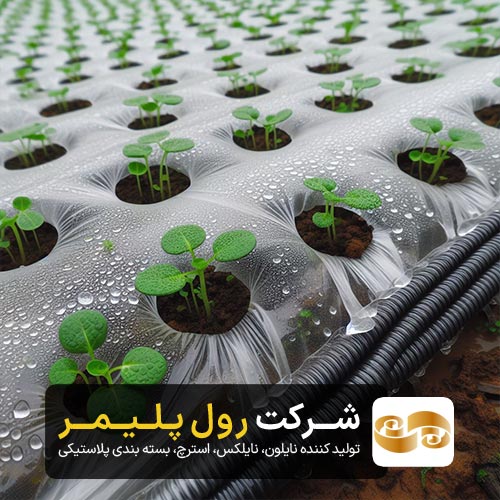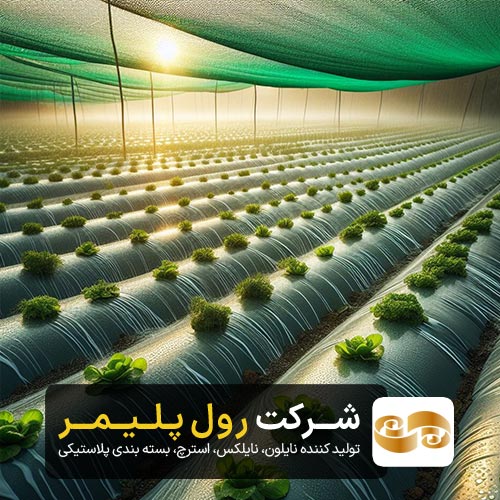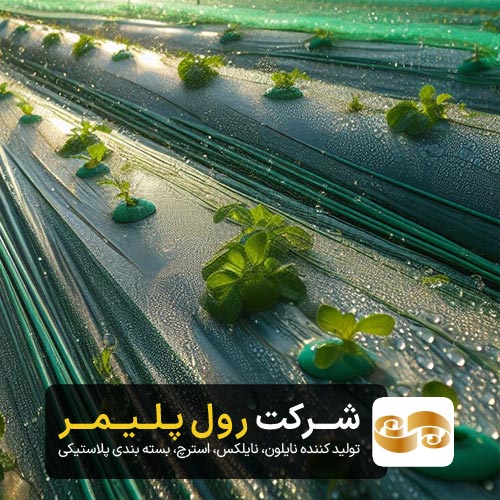
Manufacturing & wholesale of agricultural & greenhouse Nylons (agricultural plastic)
Roll Polymer Company, with more than two decades of experience in the field of production and supply of plastic materials, as one of the pioneers of the industry, is engaged in its productions in the field of agricultural nylon suitable for agriculture and greenhouses. Among the products produced by this company, we can mention polyethylene covers, drip irrigation films, agricultural bags, greenhouse cover sheets and other related products.
The plastics offered by Roll Polymer Company are of a type that has the necessary resistance and strength to face different environmental conditions in agriculture and greenhouses. These products are marketed as important links in the production and cultivation chain in terms of quality and performance so that farmers and greenhouse owners can use them to improve performance and better products.
By using the plastics produced by this company, farmers and greenhouse owners are able to achieve higher productivity, lower costs, better control over environmental conditions, and improve the performance of their products. Roll Polymer Company is recognized as one of the main choices in the agricultural and greenhouse industry by providing quality products and reliable after-sales services.
Types of agricultural Plastic Nylons and their applications
- Nylon Greenhouse Cover: This type of nylon is used for greenhouse structures and farm covers to protect crops from wind, rain, sunlight and other environmental factors.
- Drip Irrigation Films: This type of nylon is used to make drip irrigation systems that help reduce water consumption and improve irrigation efficiency.
- Nylon soil cover: It is used to maintain soil moisture and control weeds. This type of nylon reduces the need for frequent watering and planting better crops.
- Agricultural bags: Resistant nylons are used to pack and store agricultural products such as vegetables, fruits and other products in farms and markets.
- Animal shelters: Resistant nylons are used to make animal shelters in farms and livestock centers, which help protect animals from various environmental conditions.
- Breathable films: This type of nylon is used for packaging agricultural products such as fruits and vegetables with the aim of increasing the useful life and maintaining the freshness of the products.


Types of agricultural & greenhouse nylon
- Polyethylene nylon (PE): This type of nylon is used to make greenhouses and cover fields. It is sunproof and resistant to different environmental conditions.
- Nylon Polypropylene (PP): This type of nylon is used for packaging agricultural products such as vegetables and fruits due to its high resistance to breaking and tearing.
- Nylon Carbonate (PC): This type of nylon is used to make greenhouses and field covers. Its high resistance to breaking and tearing and its light weight are its important features.
- Polyvinyl chloride (PVC) nylon: This type of nylon is used to build greenhouse structures and cover fields. It is cheaper than many other materials and resistant to different environmental conditions.
- Nylon Shrink (POF): This type of nylon is used to pack agricultural products and protect them from humidity and air pollution. The ability to shrink with temperature and not to penetrate steam and moisture is one of the advantages of this type of nylon.
Comparison of types of agricultural and greenhouse bags
- Nylon PE: is suitable for use in greenhouses and has good resistance to ultraviolet rays.
- Nylon PP: This type of bag is suitable for packaging products and has the ability to de-fog and resist ultraviolet rays.
- Nylon PC: It is recommended for use in greenhouses and has a very high resistance to ultraviolet rays.
- PVC nylon: is suitable for packaging and also has anti-fog and UV resistance properties.
- Nylon POF: This type of bag is used for packing products in terms of its very high resistance and ability to shrink, and it also has resistance to ultraviolet rays.
| bag type | Quality | Use | Price | Production time | Width | Features |
| Nylon PE | Top | Greenhouses | International | Medium | variable | UV resistant |
| Nylon PP | Good | Packaging | National | low | variable | Anti-fog, UV resistant |
| Nylon PC | Great | Greenhouses | International | Top | variable | UV resistant |
| Nylon PVC | Medium | Packaging | National | low | variable | Anti-fog, UV resistant |
| Nylon POF | Very good | Packaging | International | low | variable | Shrinkable, UV resistant |
Follow us on social networks
Features and applications of agricultural and greenhouse nylons
- Resistance to ultraviolet rays: Quality agricultural and greenhouse nylons have a high resistance to ultraviolet rays, which prevents damage and the generation of microbes.
- Resistance to breaking: These types of nylons are usually produced from resistant and flexible materials that prevent them from breaking easily.
- Anti-insect and anti-wheat: Some agricultural and greenhouse nylons are produced with anti-insect and anti-wheat properties that help protect crops from pests and plant diseases.
- Transparency: These types of nylons usually have a high transparency that allows viewing of the internal contents.
- Product protection against environmental conditions: Agricultural and greenhouse nylons are used to protect products from wind, rain, direct sunlight, and other adverse environmental conditions. >
- Temperature and humidity control: These types of nylons can in some cases help control temperature and humidity in greenhouses and agricultural environments and optimize environmental conditions for better plant growth.
- Pest and disease control: Some agricultural and greenhouse nylons have anti-insect and anti-wheat properties that can be effective in controlling plant pests and diseases.
- Increasing the useful life of products: Using agricultural and greenhouse nylons, you can increase the useful life of products and reduce waste.
- Creative killing: Some agricultural nylons are used to create a favorable environment for planting and growing plants in the cold seasons of the year, this action is known as creative killing.
- Nutritional management: By using agricultural nylons, you can have a better management of plant nutrition and optimal use of water and fertilizer resources.
- Soil and water conservation: Using agricultural nylons can help conserve soil and water in agricultural areas and help reduce soil erosion and loss of water resources.
- Sustainable development: The use of agricultural nylons can contribute to the sustainable development of agriculture and reduce dependence on chemicals.
Classification of nylons based on customer needs
- Protecting plants against environmental conditions: Greenhouse nylon is used to protect plants from wind, rain, snow, and direct sunlight.
- Temperature and humidity control: These types of nylons can be effective in controlling the temperature and humidity inside the greenhouses and optimize the environmental conditions for better plant growth.
- Pest and disease control: Some greenhouse nylons have anti-insect and anti-wheat properties that can be effective in controlling plant pests and diseases.
- Increasing the useful life of products: Using greenhouse nylons can increase the useful life of products and reduce wastage.
- Reducing the need for water and fertilizers: The use of greenhouse nylons can reduce the need for water and fertilizers and help in the optimal management of resources.
- Soil and water conservation: Using greenhouse nylons can help conserve soil and water in agricultural areas and help reduce soil erosion and loss of water resources.
نایلون مالچ یک نوع فیلم نایلونی است که به عنوان مالچ یا پوشش بر روی محصولات کشاورزی استفاده میشود. این نوع نایلون به صورت لایه ای بر روی محصولات کشاورزی مانند صیفی جات، سبزیجات، میوه ها و گلها قرار میگیرد و به محافظت از آنها در برابر عوامل مختلف محیطی کمک میکند. ویژگیها و کاربردهای اصلی نایلون مالچ عبارتند از:
- حفاظت از محصولات: نایلون مالچ به عنوان یک لایه محافظ بر روی محصولات کشاورزی قرار میگیرد و از آنها در برابر باد، باران، برف، حشرات و بیماری ها محافظت میکند.
- حفظ رطوبت: این نوع نایلون میتواند رطوبت را در داخل محصولات حفظ کرده و از خشک شدن زودرس آنها جلوگیری کند.
- کاهش تبخیر: استفاده از نایلون مالچ میتواند کاهش تبخیر آب از سطح محصولات و خاک را فراهم کند و به صرفه جویی در مصرف آب کمک کند.
- کنترل دما: این نوع نایلون میتواند در کنترل دما در داخل محصولات موثر باشد و شرایط محیطی را برای رشد بهینه آنها فراهم کند.
- افزایش بازدهی محصولات: با ایجاد شرایط محیطی مطلوب، نایلون مالچ میتواند به افزایش بازدهی و کیفیت محصولات کمک کند.
- کاهش استفاده از سموم شیمیایی: استفاده از نایلون مالچ میتواند کمک کند تا نیاز به استفاده از سموم شیمیایی در کشاورزی کاهش یابد و به کشاورزان کمک کند تا از روشهای پایدارتر و سازگار با محیط زیست استفاده کنند.
- Retention of freshness and quality: Silo nylon can act as a protective layer on the food inside the silos, protecting them from air, water, sunlight and microbes, which It helps to maintain the freshness and quality of food.
- Longer shelf life: By creating a protective environment for food, silvy nylon can help to keep food longer and longer.
- Waste reduction: By maintaining the freshness and quality of food, Silo Nylon can help reduce waste during storage and prevent wasting resources.
- Easy to use: This type of nylon is very flexible and can be easily placed and installed on different silos.
- Cost reduction: By increasing the shelf life of food and reducing waste, nylon silo can help to reduce the costs of maintaining and storing food.
Disinfectant plastics is a type of film that is used as a protective coating on the soil in gardens and fields. These films are often produced from polyethylene materials and have properties that help maintain soil moisture, reduce water evaporation, and protect the soil from pests, diseases, and harmful bacteria. By reducing direct sunlight, these films can also protect against extreme heat and beneficial atmospheric changes in the plant’s growing environment. The use of disinfecting plastics in agriculture and horticulture can help improve product performance and reduce damage caused by environmental factors.
Online price inquiry for nylon & agricultural plastic
To get the price, you can simply fill out the opposite form and send us your information and the desired type of greenhouse and agricultural plastic. If your design file is ready, the final price will be calculated more accurately, but if you do not have the file and Or if you need to use our design services, it is not a problem.
The price of agricultural nylon depends on several factors, including the quality of the raw materials, the required size, the presence of additives, custom designs and colors. These factors can all affect and determine the final price. To buy all kinds of agricultural nylon and get more information about prices, please contact us to guide you.
Production timing of agricultural plastics
Agricultural plastics of any model with any width are available in the warehouse of Roll Polymer Factory and you can buy these ready-made products in bulk, if these products are not suitable for your applications or if you have certain standards. In any case, you can register a request from this category in the form of a production order.
Usually, the time required if the production line is empty is about 3 to 5 weeks, which of course depends on the amount of the order and the market conditions, however, according to the queue of customers, you can get a more accurate time from the sales associates.
Frequently asked questions before ordering agricultural and greenhouse nylon
How many meters is one kilogram of wide plastics?
The weight of each wide plastics roll may vary depending on the thickness and type of use. Typically, agricultural and greenhouse plastics rolls have a standard width of about 500 mm and a thickness usually in the range of 250 microns to 1500 microns. The weight of each roll also depends on the size used for different applications, but typically the weight of each wide plastics roll may be between 2 and 30 kg.
What is the difference between two-layer and three-layer agricultural plastics (wide plastics)?
- Double-layer agricultural plastics (two layers):
- This type of plastics has two layers, which are usually made from high quality polyethylene raw materials.
- The outer layer is relatively more sewn from plastics, which is designed to be more resistant to wear and tear.
- This type of plastics is mainly used for packaging agricultural products such as vegetables, fruits and flowers.
- Three-layer agricultural plastics (three layers):
- This type of plastics has three layers, in addition to the outer layers, there is another inner layer, which is effective as a thinner layer to prevent the penetration of air, moisture and other gases.
- The inner layer is usually made of materials such as ethylene vinyl acetate (EVA) or polyamide, which have more thin properties.
- Three-layer plastics has the best performance in maintaining the freshness and marketability of products and is used for different types of agricultural products such as vegetables, fruits, flowers and greenhouse products.
What colors are agricultural plastics produced in?
In what dimensions and thickness are agricultural plastics usually produced?
Agricultural plastics are usually produced in different sizes and thicknesses that meet the different needs of farmers and gardeners. The dimensions of these plastics are usually based on the width and length of the rolls, which are produced in different lengths and widths, such as 12 meters in width of 50 microns, 14 meters in width of 100 microns, etc. Also, the thickness of these plastics may vary and are usually produced in the 20-200 micron thickness range, although some specialty products may be available in other thicknesses.
Checking the price of global polyethylene
The price of polyethylene as the main material for the production of nylons has an effect on the final price of such products, considering that domestic petrochemical companies set the price of raw materials based on international transactions and currency conversion to Tomans (Rials). It is possible to reach the price limits by considering the price changes of this material in the world, for most of the customers in Iran, especially the price is very important, and paying attention to the market changes can affect your profit and loss process in different orders and time frames. be Use this tool and price tolerance only to check the order time, the problems of Iran’s market and currency do not need further explanation.
